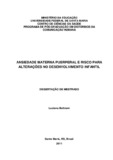| dc.creator | Beltrami, Luciane | |
| dc.date.accessioned | 2011-09-26 | |
| dc.date.available | 2011-09-26 | |
| dc.date.issued | 2011-03-04 | |
| dc.identifier.citation | BELTRAMI, Luciane. PUERPERAL MATERNAL ANXIETY AND RISK TO CHANGES IN CHILD DEVELOPMENT. 2011. 102 f. Dissertação (Mestrado em Fonoaudiologia) - Universidade Federal de Santa Maria, Santa Maria, 2011. | por |
| dc.identifier.uri | http://repositorio.ufsm.br/handle/1/6496 | |
| dc.description.abstract | This research aimed at comparing the correlations between the absence or presence of risk indicators for child development and the presence or absence of maternal anxiety state, analyzing the relationship between difficulty in setting up the experience of motherhood and the presence of risk indicators for child development as well as interference or not socioeconomic, demographic, psychosocial and obstetrical. The methodology applied was to be quantitative descriptive character with casual comparison of the behavioral manifestations of the mother-baby interactive process. The sample consisted of 182 mother-infant dyads, those born at term or preterm, in a university hospital in the central region of Rio Grande do Sul, whose babies have passed through newborn hearing screening in the period from March to June 2010. We performed a interview, applied to the Beck Anxiety Scale (BAI) and the protocol IRDls and observed the interaction of the dyad. Statistical analysis was given by applying non-parametric tests. The results have shown a positive correlation between the presence of risk to infant development and maternal state anxiety. Also it was found that the presence of difficulties in forming the experience of motherhood correlated statistically with the presence of risk to child development. However, the risk to children's development is multifactorial, and the need to check the baby and constitutional aspects of the relationship to the environment, especially the mother, to analyze and decide on the clinical referral. | eng |
| dc.format | application/pdf | por |
| dc.language | por | por |
| dc.publisher | Universidade Federal de Santa Maria | por |
| dc.rights | Acesso Aberto | por |
| dc.subject | Comunicação humana | por |
| dc.subject | Psicologia do desenvolvimento | por |
| dc.subject | Ansiedade materna | por |
| dc.subject | Interação mãe-bebê | por |
| dc.subject | Human communication | eng |
| dc.subject | Developmental psychology | eng |
| dc.subject | Maternal anxiety | eng |
| dc.subject | Other-infant interaction | eng |
| dc.title | Ansiedade materna puerperal e risco para alterações no desenvolvimento infantil | por |
| dc.title.alternative | Puerperal maternal anxiety and risk to changes in child development | eng |
| dc.type | Dissertação | por |
| dc.description.resumo | Esta pesquisa teve como objetivos analisar comparativamente as associações entre a ausência ou presença de índices de risco ao desenvolvimento infantil e presença ou ausência de estado ansioso materno; analisar a relação entre dificuldade na constituição da experiência da maternidade e a presença de índices de risco ao desenvolvimento infantil, bem como a interferência ou não de variáveis socioeconômicas, demográficas, psicossociais e obstétricas. A metodologia aplicada foi do tipo quantitativa descritiva, com caráter casual comparativo sobre as manifestações comportamentais do processo interativo mãe-bebê. A amostra foi constituída de 182 díades mães-bebês, nascidos a termo ou pré-termo, em um hospital universitário da região central do Rio Grande do Sul, que estavam realizando triagem auditiva neonatal no período de março a junho de 2010. Foi realizada uma entrevista, aplicada a escala de ansiedade de Beck (BAI) e o protocolo IRDIs e observada a interação da díade mãe-bebê. A análise estatística deu-se pela aplicação de testes não-paramétricos. Os resultados demonstraram que há uma correlação positiva entre presença de risco ao desenvolvimento infantil e estado materno ansioso. Também verificou-se que a presença de dificuldades na constituição da experiência da maternidade correlacionou-se estatisticamente com a presença de risco ao desenvolvimento infantil. Contudo, o risco ao desenvolvimento infantil é multifatorial, sendo necessário verificar os aspectos constitucionais do bebê e relacionais com o ambiente, sobretudo a mãe, para analisar e decidir acerca do encaminhamento clínico. | por |
| dc.contributor.advisor1 | Souza, Ana Paula Ramos de | |
| dc.contributor.advisor1Lattes | http://lattes.cnpq.br/7859963389320763 | por |
| dc.contributor.advisor-co1 | Moraes, Anaelena Bragança de | |
| dc.contributor.advisor-co1Lattes | http://lattes.cnpq.br/4262448037922838 | por |
| dc.contributor.referee1 | Keske-soares, Marcia | |
| dc.contributor.referee1Lattes | http://lattes.cnpq.br/2993790524055307 | por |
| dc.contributor.referee2 | Roso, Adriane | |
| dc.contributor.referee2Lattes | http://lattes.cnpq.br/5781004524826262 | por |
| dc.creator.Lattes | http://lattes.cnpq.br/6882397203204143 | por |
| dc.publisher.country | BR | por |
| dc.publisher.department | Fonoaudiologia | por |
| dc.publisher.initials | UFSM | por |
| dc.publisher.program | Programa de Pós-Graduação em Distúrbios da Comunicação Humana | por |
| dc.subject.cnpq | CNPQ::CIENCIAS DA SAUDE::FONOAUDIOLOGIA | por |


